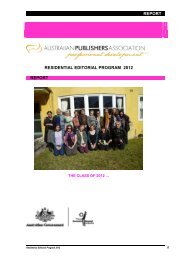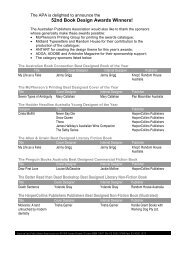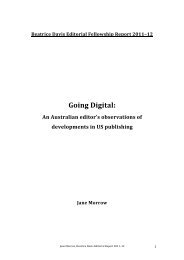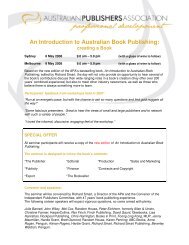Report 2013 - Kelly Fagan HERE - Australian Publishers Association
Report 2013 - Kelly Fagan HERE - Australian Publishers Association
Report 2013 - Kelly Fagan HERE - Australian Publishers Association
Create successful ePaper yourself
Turn your PDF publications into a flip-book with our unique Google optimized e-Paper software.
The Evolution of Marketing and Publicity Strategy<br />
Looking at book promotion and the way in which trade publishers are responding to changing market channels it<br />
seems important to note that this is a process of evolution not revolution. And there are two parts to the process<br />
– publishers need to evolve their overall strategies concerning marketing objectives and budgeting processes, and<br />
marketers and publicists need to evolve in terms of the activities they plan to promote books at a title by title level.<br />
As Mike Shatzkin says in his blog Idealog:<br />
‘<strong>Publishers</strong> have a lot to change in the way they do their marketing. We’ve advocated for years that<br />
publishers look at marketing as an investment, building assets, such as email lists of consumers they<br />
can reach for free, through their marketing efforts for subsequent use. That works better if the house’s<br />
marketing efforts are vertical, or audience-centric, which enables repeat efforts to the same people to<br />
bear fruit.’ 43<br />
As discussed earlier in this report, many of the UK publishers I visited were implementing or had already implemented<br />
‘vertical structures’ to varying degrees within their marketing teams in order to target consumer groups and market<br />
segments more effectively and more regularly. In terms of overall strategy, Sara Lloyd seemed to sum up the<br />
sentiment of all of publishers I visited when she said:<br />
‘In trade publishing in particular, publishers tend to think book by book, campaign by campaign, short<br />
term, short term, short term. I think we’re going to see a trend moving away from book by book campaigns<br />
to much more, much broader, much deeper ongoing strategies, including online community building<br />
and brand building, so that you’re not just living or dying by the next book. We’re going to need to have<br />
businesses that can have a longer term vision than that, and in general there’s going to be a greater focus<br />
on developing and communicating brands, because in the cross-media landscape that’s what works.’ 44<br />
With regards to online community building a new study conducted by Bowker Market Research reveals that the<br />
number of publisher-owned online communities in the US and UK is set to more than double by 2015. The study<br />
also investigated the rationale and perceived benefits for publishers moving into this arena, revealing that:<br />
▪▪<br />
84% of publishers felt their spending on online communities would increase in the next two years with only 14%<br />
envisaging expenditure remaining stagnant<br />
▪▪<br />
64% of publishers with online communities were convinced that their investment in this market is already paying<br />
off and a further 24% believed it would do so in the short term<br />
▪▪<br />
73% of all the publishers interviewed felt that online communities helped or would help them to engage better with<br />
their audiences<br />
▪▪<br />
72% of trade publishers said they helped or would help to increase direct relationships with customers and 45%<br />
claimed they provided or would provide good marketing support to sales channels<br />
▪▪<br />
40% of academic and professional publishers said that increasing knowledge and understanding of customers<br />
was a key benefit, whilst 40% felt increasing content usage was a priority<br />
Although currently only 16% of all respondents viewed online communities as viable direct sales channels, the<br />
formats that have benefited most from online community activity are e-books for trade publishers (40%) and online<br />
resources for academic publishers (67%). 45<br />
When discussing the findings at the <strong>2013</strong> London Book Fair, Jo Henry, Director, Bowker Market Research, said:<br />
‘There is a substantial amount of activity going on in this area as publishers seek new ways in which to engage directly<br />
with their consumers. It is interesting to note that in this survey US publishers were not significantly more advanced<br />
than UK ones – and that trade publishers appear to be leading the way in developing online communities.’ 46<br />
43 http://www.idealog.com/blog/book-marketers-need-rethink-three-things-time-timing-budgeting/<br />
44 Transcript of Dutch Foundation for Literature 8th International Non-Fiction Conference, 29 January 2011 (courtesy of Peter Collingridge)<br />
45 http://www.bookmarketingsociety.co.uk/<strong>2013</strong>/04/publishers-online-communities-set-to-double-by-2015/#coverage<br />
46 http://www.stm-publishing.com/publishers-online-communities-to-double-by-2015/<br />
Author: <strong>Kelly</strong> <strong>Fagan</strong><br />
14









